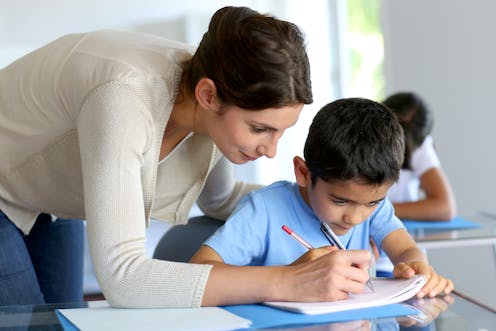Only 1 in 3 teachers use research evidence in the classroom – this is largely due to lack of time
- Written by Joanne Gleeson, Research Fellow in Education, Monash University

Even before the pandemic, recent research[1] shows most Australian teachers worked an average of 140 to 150% (one-and-a-half times) of their paid hours in a typical week. And they’re not necessarily getting to focus on aspects of the job they believe are important, such as actual teaching. In fact, the same research shows teachers spend, on average, 1.5 times as many hours on non-teaching tasks, such as administration and compliance reporting, as they do on face-to-face teaching.
Adding to teachers’ workloads are growing expectations[2] they will find and use research to improve their practice for the benefit of students. References to the use of research and evidence-based initiatives now feature in various state-level school improvement frameworks, such as the Victorian Department of Education and Training’s Framework for Improving Student Outcomes (2.0)[3], national professional standards[4], and professional learning programs such as those provided by the Victorian Academy of Teaching and Learning[5].
Read more: 'Exhausted beyond measure': what teachers are saying about COVID-19 and the disruption to education[6]
By reading and using the latest research, teachers can improve their knowledge and teaching skills concerning a number of everyday issues. These range from student well-being and school engagement to subject expertise and different teaching approaches, including online learning. But using research is complex and takes time to do well – time that teachers just don’t seem to have.
Over the past two years, our work at the Monash Q Project has involved surveying and interviewing 1,725 Australian teachers[7] and school leaders from primary and secondary schools across Australia to understand how and why they use research in practice.
We gave them a number of survey items to respond to. Having sufficient time was a key challenge they faced. Most indicated they “did not have adequate time to engage with research” (76%) and struggled to “keep up with new research” (76%).
Nearly two-thirds did not believe their school provided sufficient “structured time dedicated to reading, discussing and understanding research” (63%). As such, many reported giving up their own time to engage with research.
How much of their own time teachers give up
One in three teachers (33%) indicated they consulted research before the start of the school year, and one in four (25%) did so during the holidays between terms. For those who also consulted research during the school term, more than two-thirds (69%) indicated they did so at home on the weekend.
In most cases teachers engaged with research for less than 30 minutes at a time. Only when teachers engaged with research at home on the weekend did they usually spend more than 30 minutes on this task.
Only a small number of teachers regularly use research
Many teachers also told us they didn’t have the necessary skills[9] when it came to understanding the research appropriately. For instance, 55% said they lacked confidence in “knowing where to find relevant research”, 64% in how to “analyse and interpret research” and 49% in how to “judge the quality of research”.
Due to time constraints and the lack of necessary skills, only a minority of teachers reported regularly using research (37%) or university-based guidance (30%) in their practice.
Teachers want to use research
Teachers told us using research well[10] matters, though, when it comes to doing a good job and supporting their professionalism.
Most teachers indicated that using research had both “influenced their practice” (81%) and “changed their thinking” (74%) for the better. Nearly three-quarters believed research use was “critical to being a good educator” (74%). During one interview, a NSW school leader connected research use with having a teaching mindset of “professional excellence”.
A Queensland school leader said:
[…] it would be careless and wrong professional conduct if we did not reach or try to gain as much evidence (and knowledge) about student behaviour as we could.
Teachers also believed “research would help improve student outcomes” (83%), and most felt “clear about how research could be used to change practice” (75%). This contributes to growing international evidence[11] that associates teachers’ research use with learning and teaching improvements.
Teachers need more time
Research shows one in four teachers[12] intend to leave the profession before retirement, and time is one key factor. Australian teacher educators[13] and international educators[14] are calling for teachers’ workloads, particularly administrative and compliance obligations, to be addressed.
To do so effectively, we must make sure teachers’ workloads are not simply reduced, but reorganised to provide time for critical professional work such as engaging with research. This change is not just important for teachers, but also for their students.
Read more: Schools are surveying students to improve teaching. But many teachers find the feedback too difficult to act on[15]
References
- ^ recent research (www.aitsl.edu.au)
- ^ growing expectations (www.pc.gov.au)
- ^ Framework for Improving Student Outcomes (2.0) (www2.education.vic.gov.au)
- ^ national professional standards (www.aitsl.edu.au)
- ^ Victorian Academy of Teaching and Learning (www.academy.vic.gov.au)
- ^ 'Exhausted beyond measure': what teachers are saying about COVID-19 and the disruption to education (theconversation.com)
- ^ surveying and interviewing 1,725 Australian teachers (bridges.monash.edu)
- ^ Shutterstock (www.shutterstock.com)
- ^ have the necessary skills (doi.org)
- ^ told us using research well (doi.org)
- ^ growing international evidence (www.routledge.com)
- ^ one in four teachers (www.aitsl.edu.au)
- ^ Australian teacher educators (www.aare.edu.au)
- ^ international educators (www.theguardian.com)
- ^ Schools are surveying students to improve teaching. But many teachers find the feedback too difficult to act on (theconversation.com)

















